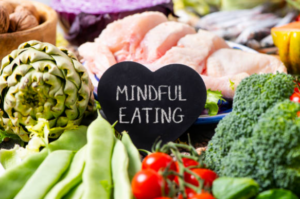Nourishing Body and Soul with What We Eat

In a world where skincare products promise miracles and cosmetic procedures promise eternal youth, it’s easy to forget the simplest and most powerful tool in our beauty arsenal: nutrition. What we eat plays a profound role in how we look and feel, impacting not just our physical appearance but also our mental well-being. In this blog, we’ll explore the concept of nutrition as self-care, delving into how the foods we consume can nourish both our bodies and souls for radiant health and beauty.
While we often view food as mere sustenance to fuel our bodies, it’s so much more than that. Food is medicine. Food is energy. Food is pleasure. Every morsel we consume has the potential to heal, energize, and delight us. By choosing nutrient-dense, whole foods, we can optimize our health and vitality from the inside out.
Nutrition and Skin Health
Our skin is a dynamic organ that reflects not only our genetics and external environment but also our internal health and nutritional status. While skincare products can certainly help improve the appearance of our skin from the outside, true radiance begins with nourishment from within. Let’s explore how specific nutrients found in whole foods can promote healthy, glowing skin.
1. Hydration from Within:
Proper hydration is essential for maintaining skin health and vitality. When we’re adequately hydrated, our skin appears plump, firm, and radiant. However, dehydration can lead to dryness, dullness, and even exacerbate skin conditions like acne and eczema.
In addition to drinking plenty of water throughout the day, incorporating water-rich foods into your diet can further support hydration from within. Foods such as cucumbers, watermelon, oranges, strawberries, and bell peppers are not only delicious but also contain high levels of water, helping to keep your skin hydrated and refreshed.
Moreover, certain fruits and vegetables are rich in electrolytes, such as potassium and magnesium, which play a crucial role in maintaining proper fluid balance in the body. Including electrolyte-rich foods like bananas, spinach, and coconut water in your diet can help replenish electrolyte levels and support optimal hydration for healthy, glowing skin.
2. Antioxidant-Rich Foods:
Antioxidants are powerful compounds that help protect our skin from oxidative stress caused by free radicals, environmental pollutants, and UV radiation. By neutralizing free radicals, antioxidants help prevent cellular damage and inflammation, thereby promoting a more youthful and radiant complexion.
Some of the most potent antioxidants for skin health include vitamins A, C, and E, as well as polyphenols and flavonoids found in various fruits, vegetables, and herbs.
Vitamin C, in particular, is essential for collagen synthesis, a process vital for maintaining skin elasticity and firmness. Foods rich in vitamin C, such as citrus fruits, kiwi, strawberries, bell peppers, and broccoli, can help support collagen production and protect the skin against premature aging.
Vitamin E acts as a potent antioxidant, protecting the skin from UV damage and promoting skin repair and regeneration. Nuts, seeds, avocado, and leafy greens are excellent sources of vitamin E, providing the skin with essential nutrients to maintain its health and vitality.
Polyphenols and flavonoids, found in foods like berries, dark chocolate, green tea, and red wine, also offer significant antioxidant benefits for the skin. These compounds help reduce inflammation, improve blood flow, and enhance the skin’s natural defense mechanisms, resulting in a clearer, more radiant complexion.
Incorporating a variety of antioxidant-rich foods into your diet can help combat oxidative stress and promote overall skin health, leaving you with a luminous and youthful glow.
3. Healthy Fats for Skin Barrier Function:
The skin’s outermost layer, known as the stratum corneum, serves as a protective barrier against environmental aggressors, moisture loss, and microbial invasion. A healthy skin barrier is essential for maintaining optimal hydration levels, preventing water loss, and protecting against irritants and pathogens.
Healthy fats, such as omega-3 and omega-6 fatty acids, play a crucial role in supporting skin barrier function and integrity. These essential fatty acids are incorporated into the lipid bilayers of the skin barrier, helping to maintain its structure and flexibility.
Omega-3 fatty acids, found in fatty fish like salmon, mackerel, and sardines, as well as flaxseeds, chia seeds, and walnuts, have anti-inflammatory properties that can help calm redness and irritation in the skin. These fats also help retain moisture within the skin, resulting in a smoother, more supple complexion.
Omega-6 fatty acids, found in sources like evening primrose oil, borage oil, and hemp seeds, are also important for skin health, contributing to the maintenance of the skin barrier and promoting overall hydration and elasticity.
Incorporating a balance of omega-3 and omega-6 fatty acids into your diet can help support skin barrier function, reduce inflammation, and improve overall skin health, resulting in a more radiant and resilient complexion.

4. Collagen-Boosting Foods:
Collagen is the most abundant protein in the body and plays a vital role in maintaining the structure, elasticity, and firmness of the skin. As we age, collagen production naturally declines, leading to wrinkles, fine lines, and sagging skin. However, certain nutrients can help support collagen synthesis and promote healthy skin aging.
One of the key nutrients for collagen production is vitamin C, which is essential for the synthesis of collagen fibers in the skin. In addition to its antioxidant properties, vitamin C helps activate enzymes involved in collagen synthesis, thereby promoting skin repair and regeneration.
Foods rich in vitamin C, such as citrus fruits, strawberries, kiwi, guava, and bell peppers, can help support collagen production and protect against collagen breakdown caused by UV radiation and environmental stressors.
In addition to vitamin C, other nutrients are also important for collagen synthesis, including amino acids like proline, glycine, and lysine, as well as minerals like copper and zinc.
Bone broth, made from simmering animal bones and connective tissue, is a rich source of collagen-building nutrients, including amino acids, minerals, and gelatin. Consuming bone broth regularly can help support collagen synthesis and promote skin elasticity and hydration.
Wild-caught fish, such as salmon, mackerel, and sardines, are excellent sources of omega-3 fatty acids, which have been shown to support collagen production and protect against collagen degradation in the skin.
Citrus fruits and berries are also rich in antioxidants, such as vitamin C and flavonoids, which help protect collagen fibers from oxidative damage and promote collagen synthesis.
Including a variety of collagen-boosting foods in your diet can help support skin health, reduce the appearance of wrinkles and fine lines, and promote a more youthful and radiant complexion.
5. Gut Health and Skin Connection:
The gut-skin axis refers to the bidirectional relationship between the gut microbiome and the skin. Emerging research suggests that imbalances in gut bacteria can contribute to various skin conditions, including acne, eczema, and psoriasis, while promoting a healthy gut microbiome can support clear, glowing skin.
Probiotic-rich foods, such as yogurt, kefir, sauerkraut, kimchi, and kombucha, contain beneficial bacteria that can help restore balance to the gut microbiome and support overall skin health. These foods provide the gut with essential nutrients and microbial diversity, helping to strengthen the gut barrier and reduce inflammation throughout the body.
Prebiotic foods, such as garlic, onions, leeks, asparagus, and bananas, contain fibers that feed beneficial gut bacteria, promoting their growth and proliferation. Including prebiotic-rich foods in your diet can help nourish the gut microbiome and support a healthy balance of beneficial bacteria, which in turn can benefit the skin.

Nutrition for Mental Well-being
While the physical benefits of a nutritious diet are undeniable, the impact of food on our mental and emotional well-being is equally significant. Just as certain foods can nourish our bodies, others can uplift our spirits and enhance our overall sense of well-being.
1. Mood-Boosting Foods:
Certain foods contain nutrients that support neurotransmitter production and brain health, helping to alleviate stress, anxiety, and depression. Foods rich in omega-3 fatty acids, such as salmon, walnuts, and flaxseeds, are known to support brain function and improve mood. Additionally, foods high in magnesium, such as leafy greens, nuts, and dark chocolate, can help relax the nervous system and promote feelings of calmness and relaxation.
2. Comfort Foods with a Nutritious Twist:
Comfort foods often have a bad reputation for being indulgent and unhealthy. However, with a few simple modifications, you can enjoy comforting dishes that nourish both body and soul. Swap refined grains for whole grains, opt for lean proteins like chicken or tofu, and load up on vegetables to create nutrient-rich versions of your favorite comfort foods. Whether it’s a hearty vegetable stew, a nourishing bowl of oatmeal, or a decadent dark chocolate avocado mousse, there are plenty of delicious and nutritious comfort food options to satisfy your cravings.
3. Mindful Eating Practices:
In addition to choosing nourishing foods, practicing mindful eating can further enhance the benefits of nutrition for mental well-being. Mindful eating involves paying attention to the sensory experience of eating, including the taste, texture, and aroma of food, as well as the sensations of hunger and fullness. By slowing down and savoring each bite, you can cultivate a greater appreciation for food and develop a healthier relationship with eating, reducing stress and promoting overall satisfaction and contentment.
4. The Ritual of Cooking:
The act of preparing food can be a form of self-care in itself. Engaging in the creative process of cooking allows you to connect with your food on a deeper level, infusing it with love and intention. Whether you’re experimenting with new recipes, cooking a favorite childhood dish, or simply chopping vegetables mindfully, cooking can be a therapeutic and rewarding experience that nourishes both body and soul.

In conclusion, nutrition is far more than just a means of fueling our bodies—it’s a powerful form of self-care that can nourish both body and soul. By choosing nutrient-dense foods that support skin health, mental well-being, and overall vitality, we can cultivate radiance from the inside out. So, let’s embrace the transformative power of food, savoring each bite as an opportunity to nourish ourselves and live our most vibrant, beautiful lives.

